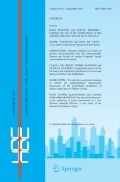Lux, Martin, Petr Sunega. 2025. „Mortgage debt versus intergenerational transfers: implications for welfare attitudes in the Czech Republic“. Journal of Housing and the Built Environment. Volume 40, pages 159–179. ISSN 1566-4910. Available from: https://doi.org/10.1007/s10901-024-10167-w
There has been a noticeable delay in the emergence of a sociology of debt, and of mortgage debt in particular. This paper seeks to fill this gap by testing whether and how the form of home financing influences welfare attitudes regarding the role of the state in housing provision and, consequently, the type of housing (welfare) policy. Specifically, we hypothesise that there are significant differences in attitudes toward the role of the state/municipalities in housing provision between homeowners who financed their home especially with the use of a mortgage debt and homeowners who received a substantial resource transfer from their family to acquire their home. We conducted our research in the Czech Republic and used data from a national survey on housing attitudes. The results demonstrate that within-family housing-related transfers strengthen the liberal attitudes of Czech homeowners and thus contribute to overall public resistance to restore public housing provision. Given that intergenerational transfers are common in East European post-socialist countries, our findings may explain why significant differences in housing regimes/policies persist between the old and new EU member states, despite EU integration and the shared experience of housing affordability crisis. The results of this research have also implications for policy practice: in super-homeownership societies, familialism in housing provision may weaken the traditional left-right axis in public welfare attitudes and, consequently, may contribute to the long-term preservation of a neoliberal housing policy. However, such a stable status quo may deepen social inequalities, which are transmitted across generations.
